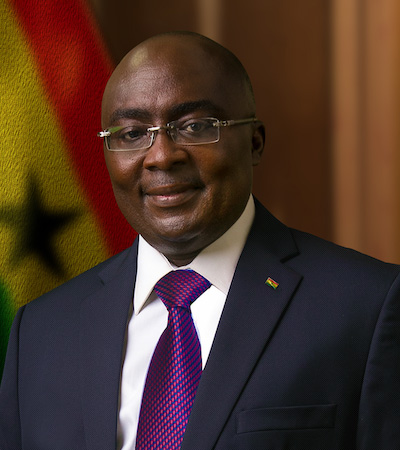
CAN DR. MAHAMUDU BAWUMIA LEARN FROM KAMALA HARRIS’ DEFEAT?
Introduction
Pollsters are re-evaluating their strategies following the outcome of the US presidential election, where Donald Trump secured a significant number of votes in the popular vote and electoral college. Now that the US election has concluded, attention shifts to Ghana’s upcoming presidential election on December 7th. Dr. Mahmoud Bawumia, the current Vice President, is vying for the top spot. Notably, he’s the first openly Muslim candidate and the first individual from northern Ghana to run for president on the New Patriotic Party ticket. Another candidate who was in a similar situation was Kamala Harris. She was the vice president and ran as the first black female. Following Kamala Harris’s defeat, Dr. Mahmoud Bawumia, Ghana’s Vice President, can glean valuable lessons to inform his presidential campaign.
Detaching from Akufo-Addo’s Unpopular Record While Embracing the Positive
Kamala Harris faced a difficult challenge when running for president: how to separate herself from the policies of President Joe Biden’s administration, while still embracing the successes. This strategic balancing act became one of the campaign’s most significant hurdles. Bawumia faces a similar dilemma as he seeks to position himself for Ghana’s presidency. On one hand, he must differentiate himself from the often-criticized record of President Akufo-Addo’s government, particularly on economic issues. On the other hand, he must find ways to link himself to the achievements that are viewed more favorably.
Bawumia’s initial political appeal was built on his reputation as an economic expert, particularly for his role in Ghana’s pre-pandemic economic growth. Under Akufo-Addo’s leadership, Ghana’s economy showed impressive growth, which Bawumia has been quick to highlight. However, the post-pandemic era has brought a host of economic challenges—hyperinflation, a depreciating currency, and rising debt—that have made it harder for Bawumia to defend his initial economic narrative.
As Vice President, Bawumia also positioned himself as a leader of Ghana’s digital transformation, a sector that he claims can drive the country’s post-pandemic economic recovery and beyond. In this regard, Bawumia has managed to carve out a distinct identity from Akufo-Addo, emphasizing his focus on digitalization as the key to future growth.
But the question remains: will voters buy this narrative? Can Bawumia successfully present himself as a leader with a fresh vision, separate from some of the unpopular baggage of Akufo-Addo’s administration, while still capitalizing on the successes—especially in digitalization—that are more clearly associated with him? His challenge is to offer a coherent, convincing vision for Ghana’s economic future, one that acknowledges the present difficulties but presents a pathway forward that feels distinct from both Akufo-Addo’s record and John Mahama’s past governance.
Navigating the Opposition: A Strategic Approach to Mahama’s Record
Kamala Harris struggled in her campaign due in part to the type of opponent – Donald Trump, who had a robust record to run on, particularly in terms of job creation, military rebuilding, and his handling of inflation and immigration. Harris, however, found it difficult to highlight her own achievements without inadvertently criticizing Biden’s record—a delicate political tightrope to walk.
For Bawumia, the situation with John Mahama is slightly different. While Mahama, like Biden, was once vice president and president, his political and governance history provides Bawumia with an opportunity to contrast himself with Mahama’s past as Vice President. However, Mahama although did not lose in 2020 as an incumbent is a seasoned politician who has a reputation of being a good communicator, as such it becomes difficult for Bawumia to have such engagements about Mahama in this electoral cycle compared to others where the NPP was in opposition or their first term.
Mahama is well versed and has tasted defeat twice from Akuffo Addo and in this cycle has done well to go at Bawumia to rather answer for the economic challenges. An important strategy that continues to tie Bawumia to the records of Akuffo Addo. His strategy has been to place the blame for Ghana’s current economic crisis squarely at the feet of the Akufo-Addo administration—and by extension, at Bawumia’s. Mahama has focused on the widespread discontent with the economic situation under Akufo-Addo, particularly on issues like inflation and public debt, which Bawumia will need to defend. However, it is important for Bawumia to not merely defend Akufo-Addo’s record but to counter-attack Mahama on his own weaknesses, especially the controversial aspects of his time in office.
Bawumia’s task is daunting, given that he has not held the presidency and therefore lacks a direct record of his own to point to. In this context, Bawumia must focus on offering a new economic outlook that contrasts with both Akufo-Addo’s current struggles and Mahama’s past governance. Rather than defending the entire Akufo-Addo administration, Bawumia should look to pivot towards a more forward-looking, progressive agenda—one that promises new leadership, economic stability, and growth in a post-pandemic world.
Carving Out a New Path
For Bawumia, the key to success lies in managing the tension between embracing the successes of Akufo-Addo’s government, distancing himself from its failures, and offering a compelling new vision for the country. As Kamala Harris learned, voters may be skeptical of candidates who are too closely tied to the status quo, even if that status quo has had successes. Bawumia must find ways to craft a distinct identity, separate from both the current administration’s struggles and the historical record of his main rival, John Mahama.
